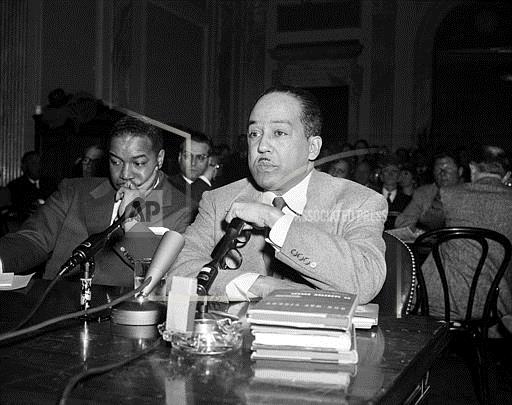
Blacklisted
by Carl Sandburg
Why shall I keep the old name?
What is a name anywhere anyway?
A name is a cheap thing all fathers and mothers leave each child:
A job is a job and I want to live, so
Why does God Almighty or anybody else care whether I take a new name to go by?
I Dream A World
by Langston Hughes
I dream a world where man
No other man will scorn,
Where love will bless the earth
And peace its paths adorn
I dream a world where all
Will know sweet freedom’s way,
Where greed no longer saps the soul
Nor avarice blights our day.
A world I dream where black or white,
Whatever race you be,
Will share the bounties of the earth
And every man is free,
Where wretchedness will hang its head
And joy, like a pearl,
Attends the needs of all mankind-
Of such I dream, my world!
In my recent blog post, Break My Ghostly Heart, I wrote about Dorothy Parker being blacklisted and the impact it had on her. However no individual was accused by the House Un-american Activities Committee (HUAC) of having more communist associations than Langston Hughes. Hughes would be forced to testify before Senator Joseph McCarthy’s subcommittee in 1953. In the end, Hughes’ legacy is one as a true American, not McCarthy. The current claims of being “more patriotic” by Trump and his supporters ring with the same falsehoods that McCarthyism did in the 1950’s.
Langston responded to a questionnaire sent by Elmer Rice to 50 writers who had been named as suspected communists by the government in Red Channels. Rice asked Langston a series of questions, but simply put – he was asking how has being blacklisted impacted you. Here is a portion of Hughes’ brilliant reply to Rice in a letter in 1952.
Elmer Rice: QUESTIONNAIRE
- Has the publication of your name in Red Channels adversely affected your employment or the use of your material in the radio and television fields?
Dear Elmer,
Here are my answers to the questionnaire re the FCC and blacklisting in TV and radio:
- The publication of my name in RED CHANNELS has not affected my employment in TV or radio. Being colored I received no offers of employment in these before RED CHANNELS appeared, and have had none since—so it hasn’t affected me at all.
- Answered above.
- Negro writers, being black, have always been blacklisted in radio and TV. Only once in a blue moon are any colored writers given an opportunity to do a script and then, usually, with no regularity, and no credits. Like Hollywood, Negroes just simply are not employed in the writing fields in the American entertainment industry.
- My personal experience has been that in my 25 years of writing, I have not been asked to do more than four or five commercial one-shot scripts. These were performed on major national hook-ups, but produced for me no immediate additional jobs or requests. One script for BBC was done around the world with an all-star cast. No American stations offered me work. My agents stated flatly, “It is just about impossible to sell a Negro writer to Hollywood or radio, and they use Negro subject matter very rarely.” Even the “Negro” shows like “Amos and Andy” and “Beulah” are written largely by white writers—the better to preserve the stereotypes, I imagine.
During the war I did a number of requested scripts for the Writers War Board, used throughout the country. Most of the white writers serving this committee also got any number of paying jobs to do patriotic scripts. Not one chance to do a commercial script was offered me.
My one period of work in radio covering several weeks was a few summers ago scripting the NBC show, “Swing Time at The Savoy”, a Negro variety revue. This was achieved at the insistence of the N.A.A.C.P. that objected to the stereotypes in the audition scripts written by white writers. NBC had at that time had not one Negro writer on its staff—which would have saved them making the mistakes the N.A.A.C.P. objected to and which were offensive to the general Negro public. As far as I know, Negro writers are, however, “blacklisted” at NBC. I know of none working there regularly.
Richard Durham in Chicago and Bob Lucas and Woody Bovell in New York are excellent radio writers but, being Negroes, they work with great irregularity—not due to being red but due to being colored.
- No point in my appearing—the color bars everyone knows have been with us since radio began, before TV was born, and long ere that.
I’d like to add, however, my personal gratitude to you and the committee for your very fine stand in relation to the freedom to work—for those writers who are white enough to work (when not red-baited) and I hope as well for those writers who have been blacklisted from birth.
And to you for your personal stand, Elmer, my very great admiration.
Sincerely yours,
Langston Hughes
Excerpted from “Selected Letters of Langston Hughes” (Knopf), edited by Arnold Rampersad and David Roessel with Christa Fratantoro. Copyright © 2014 the estate of Langston Hughes.
